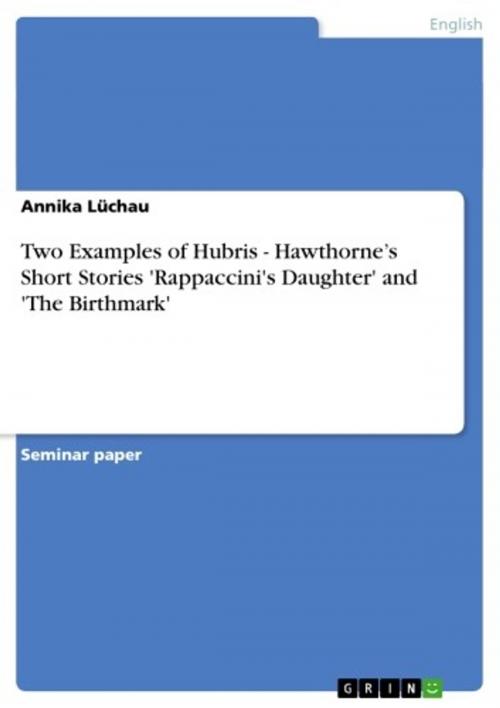Two Examples of Hubris - Hawthorne's Short Stories 'Rappaccini's Daughter' and 'The Birthmark'
Hawthorne's Short Stories 'Rappaccini's Daughter' and 'The Birthmark'
Nonfiction, Entertainment, Drama, Anthologies| Author: | Annika Lüchau | ISBN: | 9783638908719 |
| Publisher: | GRIN Publishing | Publication: | February 3, 2008 |
| Imprint: | GRIN Publishing | Language: | English |
| Author: | Annika Lüchau |
| ISBN: | 9783638908719 |
| Publisher: | GRIN Publishing |
| Publication: | February 3, 2008 |
| Imprint: | GRIN Publishing |
| Language: | English |
Seminar paper from the year 2006 in the subject American Studies - Literature, grade: 2,0, Ruhr-University of Bochum, course: Hubris, 8 entries in the bibliography, language: English, abstract: The following paper will analyze Hawthorne's short stories 'Rappaccini's Daughter' and 'The Birthmark' on the aspect of hubris. Both stories are concerned about science and depict the deaths of both two beautiful women who sacrifice their lives in the end. The term 'hubris' derives from Greek and it stands for presumption and connotes a behavior that is too confident, shows a disproportionate pride and extreme self-confidence as well as a lack of respect for other people, originally towards the gods (The Compact Oxford English Dictionary). According to Aristotle in his Poetics, it means that the protagonist is led into a fatal event that causes great harm or damage. This is caused by a hamartia or an error which leads to divine retribution, a severe punishment, either causing disaster or failure or ending in death. The catalysts often are misjudgment or ignorance (Oxford Concise Dictionary). The paper is structured as follows: First of all a brief summary of 'Rappaccini's Daughter' is given, followed by an analysis of the story. Then an interpretation of hubris in the short story will be drawn. The same structure applies also for the short story 'The Birthmark'. In the end a conclusion is drawn that summarizes the most important details about hubris.
Seminar paper from the year 2006 in the subject American Studies - Literature, grade: 2,0, Ruhr-University of Bochum, course: Hubris, 8 entries in the bibliography, language: English, abstract: The following paper will analyze Hawthorne's short stories 'Rappaccini's Daughter' and 'The Birthmark' on the aspect of hubris. Both stories are concerned about science and depict the deaths of both two beautiful women who sacrifice their lives in the end. The term 'hubris' derives from Greek and it stands for presumption and connotes a behavior that is too confident, shows a disproportionate pride and extreme self-confidence as well as a lack of respect for other people, originally towards the gods (The Compact Oxford English Dictionary). According to Aristotle in his Poetics, it means that the protagonist is led into a fatal event that causes great harm or damage. This is caused by a hamartia or an error which leads to divine retribution, a severe punishment, either causing disaster or failure or ending in death. The catalysts often are misjudgment or ignorance (Oxford Concise Dictionary). The paper is structured as follows: First of all a brief summary of 'Rappaccini's Daughter' is given, followed by an analysis of the story. Then an interpretation of hubris in the short story will be drawn. The same structure applies also for the short story 'The Birthmark'. In the end a conclusion is drawn that summarizes the most important details about hubris.















